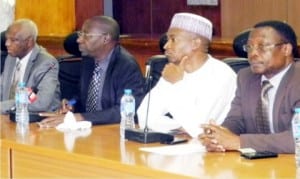Business
Expert Calls For Diversification Of Nigerian Economy

L-R: Deputy General Manager, Consumer Affairs, Nigerian Electricity Regulatory Commission (NERC), Mr Imamuddeen Talba, General Manager, Finance and Management Services, Mr Mustapha Bukar, Deputy General Manager, Public Affairs, Dr Usman Abba-Arabi, and Deputy General Manager, Enforcement Unit, Mr Chijioke Obi, at a public Consultation of the Commission’s Draft Regulations on Feed in Tariff, Smart Metering and Capping on Estimated Billing in Abuja, yesterday
Head of Economics Department, University of Abuja, Prof. Sarah Anyanwu, has called for the diversification of the Nigerian economy, to address the ongoing economic crisis in the country.
Anyanwu made the call yesterday in an interview with newsmen in Gwagwalada, Abuja.
She said that the nation’s economy was gradually declining due to fall in oil prices at the international market.
According to her, the nation’s economic activities have not been met as the revenue realised from the energy market is going down.
“ This fall has a lot of implications on the economy as the revenue realised from the oil sector falls.
“Lots of activities will not be met; even job creation is almost at zero.
“ For the first time in the country, some state governors cannot pay workers’ salaries. Somebody who cannot pay salaries will not think of creating jobs,’’ she explained.
According to her, the agriculture, mining, functional tourist centres and manufacturing sectors can be explored to create job opportunities and reduce poverty.
“We need to come back to reality and not cast all our eggs in one basket.
“ This problem has multiplier effects, as the poverty level is rising, standard of living generally is falling and unemployment is on the increase.
“The productivity of workers who have not been paid will fall. So we need to diversify our economy in order to solve the problem at hand,’’ Anyanwu said.
The oil prices backed down from 54 to 50 dollars per barrel recently for Brent Crude.
Transport
Automated Points Concession : FAAN Workers Gave 72hrs To Revise Decisions In PH

Transport
FAAN Announces Pick-Up Points for Go-Cashless Cards

Business
Fidelity Bank To Empower Women With Sustainable Entrepreneurship Skills, HAP2.0
-

 News5 days ago
News5 days agoAmend Constitution To Accommodate State Police, Tinubu Tells Senators
-

 Politics5 days ago
Politics5 days agoSenate Urges Tinubu To Sack CAC Boss
-
Business5 days ago
Crisis Response: EU-project Delivers New Vet. Clinic To Katsina Govt.
-
Business5 days ago
President Tinubu Approves Extension Ban On Raw Shea Nut Export
-

 News4 days ago
News4 days agoDisu Takes Over As New IGP …Declares Total War On Corruption, Impunity
-
Business5 days ago
Fidelity Bank To Empower Women With Sustainable Entrepreneurship Skills, HAP2.0
-
Business5 days ago
President Tinubu Extends Raw Shea Nuts Export Ban To 2027
-
Sports5 days ago
NDG: Rivers Coach Appeal To NDDC In Talent Discovery

